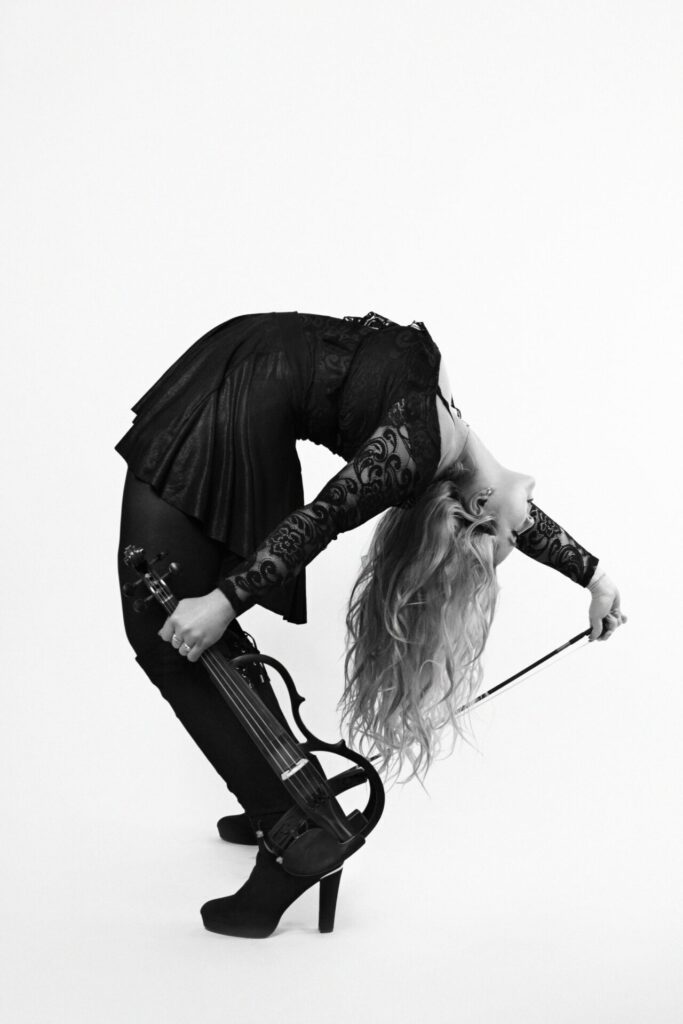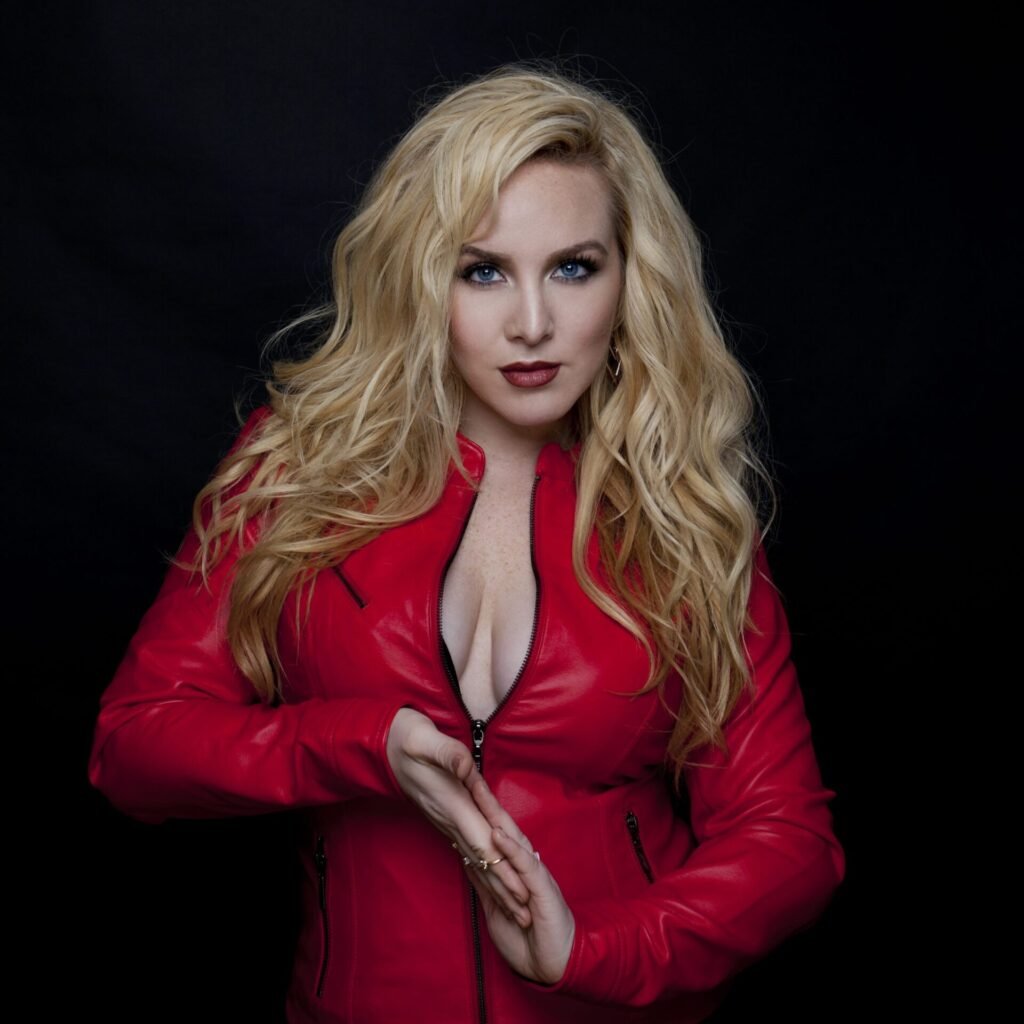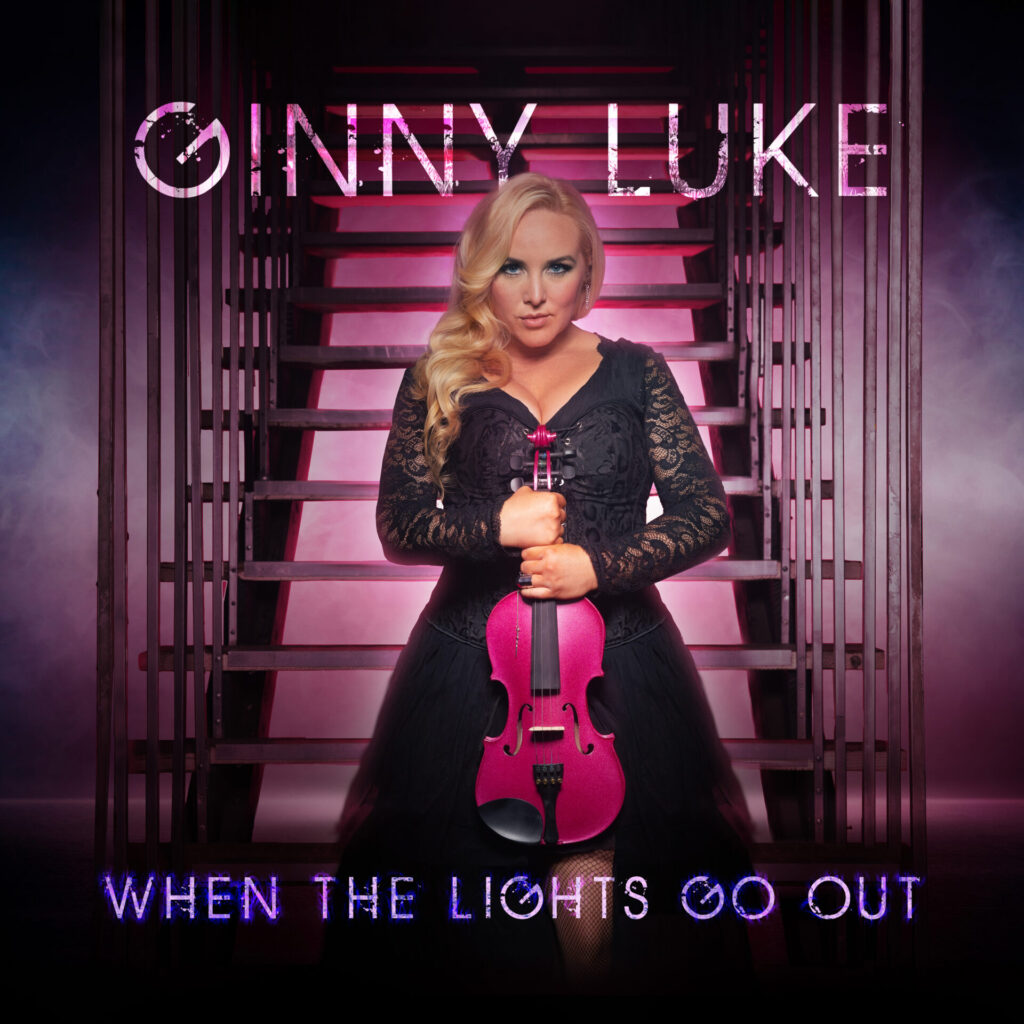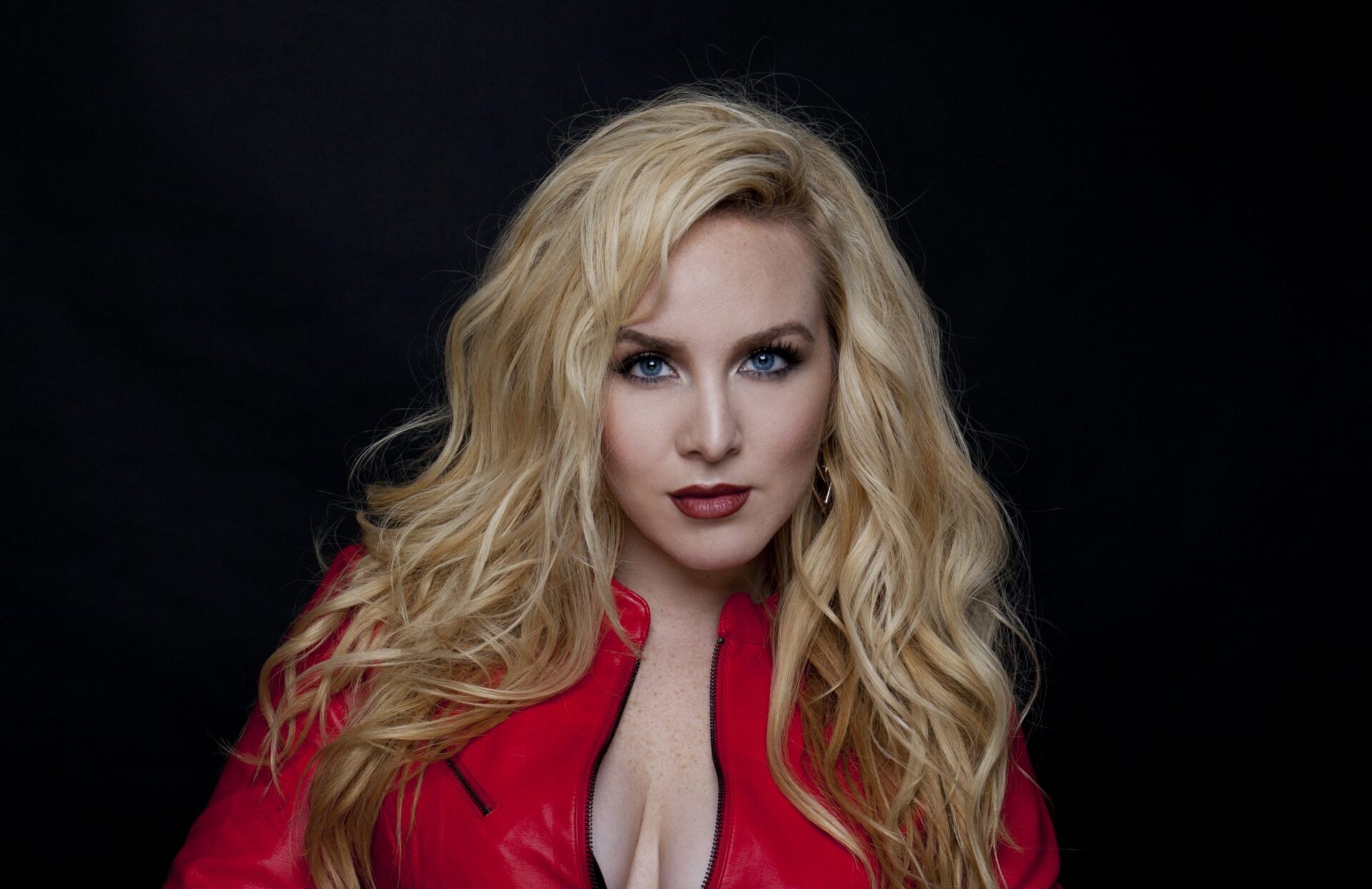Ginny’s new single, which is a sizzling rock anthem sung by a powerful woman and infused with the passionate allure of an electric violin’s seductive melodies, is released in advance of Ginny’s upcoming full-length album. “When the Lights Go Out” creates a sensory-engaging sonic tapestry by fusing the overdriven tones of the electric violin with the raw energy of rock. Ginny Luke, a fierce and captivating female recording artist, embodies confidence and sensuality in her lyrics, transporting the listener to a world where rebellion and desire coexist. Check out the exclusive interview below:

1. Can you tell us a bit about where you come from and how it all got started?
GINNY LUKE: I started classical violin, piano and ballet at age three in Vilseck, Germany, and started singing and acting in musical theater when my family moved to Iowa at age four. (My dad conducted “The Sound of Music” at the Grand Opera House, I played the role of Gretel, and the rest of my family was in the pit orchestra). From there I continued theater doing shows each year, and studied classical music at the Preucil School of Music in Iowa City, IA. I also took orchestra and chamber music study there. I studied dance at the Dubuque Dance Studio, and private acting lessons with Joe Klinebriel. I began training with a vocal teacher named Sandra Andersen at age nine, competed in vocal and violin concerto competitions, and one of the “prizes” I got if I won was going to Los Angeles at fourteen. That’s how I began recording and transitioning my life to LA – I moved to LA full-time at age fifteen, and started my career.
2. Did you have any formal training or are you self-taught?
GINNY LUKE: My music education was very formal!! I primarily studied violin with internationally known educator Doris Preucil, piano with Debra Hernstrom, (as well as teachers at summer music festivals Meadowmount, Encore, Interlochen Center for the Arts, and others). At Interlochen I studied violin with Hal Grossman, and voice with Nicole Philibosian. At the Colburn School of Music I studied violin with Dr. Yun, and conducting with Richard Rintoul. At Musician’s Institute I studied keyboards with Lisa Harriton and voice with Masta and Coreen Sheehan. I will say most of my music industry knowledge is self taught and self sought. Coming from a classical background, I knew nothing about the music business, and had to find mentors, read tons of books, and experience the industry myself with trial and error.
3. Who were your first and strongest musical influences and why the name ‘GINNY LUKE’?
GINNY LUKE: My first and strong music influences were surprisingly, Britney Spears and Christina Aguilera! Then of course Michael Jackson, then classical violinists Hilary Hahn and Itzahk Perlman. Later, artists like Herbie Hancock were played in our house, and my brother Jesse showed me bands like Red Hot Chili Peppers, Dave Matthews Band, System of a Down, and Blink-182. I had a lot of musical influence as a kid. The name ‘Ginny’ is short for my full name, Virginia.
4. What do you feel are the key elements in your music that should resonate with listeners, and how would you personally describe your sound?
GINNY LUKE: Key elements in my music – electric violin, strings, heavy guitars, powerful vocals… that’s the main element I think, power. I want people to feel powerful and courageous when they hear my music. I describe my sound as ‘female bad bitch rock with scorching violin’. That pretty much captures it – I have a lot of excitement and intensity that I put into my music; I also want to feel ‘untouchable’ and fearless when I listen to it or perform it.

5. Creative work in a studio or home environment, or interaction with a live audience? Which of these two options excites you most, and why?
GINNY LUKE: I prefer LIVE LIVE LIVE all day. I love interacting with people, sharing a musical connection. It gives me a deeper musical experience than recording too. Singing and playing in the studio is fun and more precise, more mathematical, more calculated and intentional. I love the phrase “leave it all on the stage” because I totally do – I was taught in acting that you do all the preparation work before you hit the stage, then once you’re on you forget everything and live in the moment.
6. For most artists, originality is first preceded by a phase of learning and, often, emulating others. What was this like for you? How would you describe your own development as an artist and music maker, and the transition towards your own style, which is known as Rock?
GINNY LUKE:
I had to imitate recordings of violinists and vocalists my whole childhood. Imitation is a huge component in the Suzuki method and my parents felt it was a part of a broad music education – imitating musicians of many styles, many tonalities. I think I got good at it as a kid – I especially learned how to imitate voices when I was in a girl band in my teen years, because producers wanted me to sound like their preferred artists. The thing I’ve learned by now is once you hit a certain level of musical proficiency, YOU should be calling the shots on what tone colors and phrase direction to use. That’s what artistry is – the artist makes the decisions in the art they want to express and the messages and feelings they want to portray. My development as an artist and music maker began rapidly shifting in my early twenties, towards a heavier violin tone (more overdriven, more like a guitar), and a bigger, rounder and edgier vocal tone. I started preferring playing with a band and having more room to solo on the violin.
7. What’s your view on the role and function of music as political, cultural, spiritual, and/or social vehicles – and do you try and affront any of these themes in your work, or are you purely interested in music as an expression of technical artistry, personal narrative, and entertainment?
GINNY LUKE: That’s a great question. I know my music is inherently going to serve as a social vehicle because it’s female empowered ‘loud’ music, defying the role of classical violin and a woman’s subservient role. So in itself, it is defying cultural norms – even though there have been many female rock artists, there are very few who also play what is typically known as a ‘classical’ instrument and use it to express autonomy, ecstasy, rage, and transcendence. I do address these themes in my work – I don’t know if I ‘affront’ them in my music but perhaps I do in how I speak loudly about women’s rights, human rights, and social change issues. I am pretty clear about how women (and all people) should have equal rights, equal opportunity and pay, the right to safety, agency over their own bodies. My songs “No Fire Burning” and “Woman I Wanted to Be” address my experience recovering from sexual assault, so I do speak out musically in those songs on my experience. I am also very much interested in technical artistry – vocally, on violin, in all production and arrangement of my music, and my live shows. One thing I love about the dichotomy of rock music with strings is the high level technical skill one has to have to be able to perform on a string instrument, and how the ethos of rock is pure expression. It’s a very interesting balance that I think about often. To add, I would say my music captures my personal narrative since I’m sharing my life experience in my songs – and I don’t regard it as more art or more entertainment, it can be whatever people feel it is. If it moves them, then hopefully they have an artistic experience. I think that’s more up to the listener.
8. Do you feel that your music is giving you back just as much fulfillment as the amount of work you are putting into it or are you expecting something more, or different in the future?
GINNY LUKE: I hope it gives people fulfillment the way my favorite records have given me fulfillment.
9. Could you describe your creative processes? How do usually start, and go about shaping ideas into a completed song? Do you usually start with a tune, a beat, or a narrative in your head? And do you collaborate with others in this process?
GINNY LUKE: I usually start with a melody line, or fragments of lyrics that I have in my head or stored in my computer over the years. I try to get to the ‘meat’ of the song right away and determine what it is I’m writing about – am I writing about a feeling, an experience, a story? I try to make that very clear in the chorus first, then write the verses around it. I love collaborating with other producers and musicians on lyrics, chords, etc. I think that’s one of the most fun aspects of writing music. It’s also very important to me that the musical and production elements of the song all serve the emotional sentiment of the message of the song. I really don’t like when musical components don’t have intention in serving the message – I feel at that point it’s not serving the music. I’m pretty deliberate in all of my background harmonies, keyboard parts and chord voicings, beat patterns, swells and sweeps, string arrangements, and mixes. I get one life on this earth so I want to make my music the most meaningful it can be.
10. Do you think is it important for fans of your music to understand the real story and message driving each of your songs, or do you think everyone should be free to interpret your songs in their own personal way?
GINNY LUKE: I would hope every listener interprets my music in their own way, to apply to their lives closely, to resonate and use my music to heal, feel understood or find power. If they’re interested, it’s cool to me if they want to know my story behind each song, but I think that’s one of the most fascinating aspects of art – that an artist can create a piece with their experience or intended meaning, and it will then be interpreted a thousand different ways.
KEEP IN TOUCH:
FACEBOOK | INSTAGRAM | TWITTER | SPOTIFY | TIKTOK | WEBSITE | YOUTUBE


